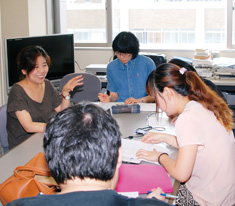Master’s Degree Program / Major in Contemporary Cultural Studies
The Major in Contemporary Cultural Studies aims to foster specialized professionals and researchers who have the specialized knowledge related to information, culture, philosophy, psychology, and life health sciences. To achieve this aim, this program intends to systematically endow students with the advanced knowledge and the methods for interdisciplinary analyses on information, culture, philosophy, psychology, and life health sciences to cultivate the skills to identify and explore issues involving contemporary cultures.
- Degrees to be awarded
- Master of Arts, Master of Philosophy

Major in Contemporary Cultural Studies
Information society culture
Media culture
- Motion picture I
(ISHIDA Minori) - Motion picture II
(KIM Joon Yang) - Representation culture
(BAMBA Satoshi) - Text culture
(INOMATA Kenji) - Popular culture
(KAI Yoshiaki) - Body expression
(To be determined) - Cultural space theory
(To be determined) - Contemporary art culture
(TANJI Yoshihiko) - Local fine-arts culture
(YAGINUMA Hirotoshi) - Functional modeling
(HASHIMOTO Manabu) - Japanese painting expression
(NAGAYOSHI Hideshi) - Western music culture
(TANAKA Koji) - Music creation theory
(SHIMIZU Kensaku) - Music expression theory
(SUZUKI Kenta) - Vocal performance theory
(SUZUKI Manami) - Performance expression theory
(UNO Tetsuyuki) - Music pedagogy
(KUDO Chiaki)
Information society
- Information system theory
(NAKAMURA Takashi) - Media theory
(KOGA Yutaka) - Theoretical sociology I
(MATSUI Katsuhiro) - Theoretical sociology II
(UCHIDA Ken) - Gender theory
(SUGIHARA Nahoko) - Social network theory
(To be determined) - Health and Medical Sociology
(ITO Hirotaka) - Cultural anthropology
(SONODA Koji) - Science, technology and society
(SATO Yasushi)
Human formation science
Thought/Psychological Science
- Religion thought
(AOYAGI Kaoru) - History of Western thought
(ABE Fukuko) - Modern ethics
(To be determined) - Comparison philosophy
(OKAJIMA Ryusuke) - Cognitive philosophy
(OTA Koji)
Mental science (basic mental course)
- Cognitive philosophy
(NIIMI Ryosuke) - Developmental psychology
(KOBAYASHI Megumi) - Comparative psychology
(To be determined) - Educational psychology
(To be determined) - Environmental psychology
(To be determined) - Social psychology
(FUKUSHIMA Osamu) - Life span developmental psychology
(MATSUI Kenji) - Handicapped-child psychology I
(ARIKAWA Hiroyuki) - Handicapped-child psychology II
(WATANABE Ruriya) - Handicapped-child linguistics
(IRIYAMA Maiko) - Personality psychology
(NAMIKAWA Tsutomu) - Applied experimental psychology
(NAKAJIMA Yutaka)
Mental science (clinical mental course)
- Clinical psychology
(SATO Tomoya) - Clinical mental assessment study
(TANAKA Tsunehiko) - Psychotherapy theory
(YOKOYAMA Tomoyuki)
Human development environmental science
- Health promotion wellness
(TANAKA Seiji) - Motor-function study
(USHIYAMA Yukihiko) - Physical exertion culture
(To be determined) - Health education
(KASAI Naomi) - Body development study
(To be determined) - Lifelong sport theory
(MURAYAMA Toshio) - Gymnastics psychology
(MORI Yasushi) - Exercise physiology
(AMANO Tatsuro) - Application health science
(KASAMAKI Jun-ichi) - Health exercise theory
(HIWA Takako) - Clothes environment-assessment study
(SUGIMURA Momoko) - Clothes environmental material science
(NAKAMURA Kazuyoshi) - Food environmental science
(To be determined) - Living environment study
(IINO Yukari) - Educational philosophy
(HUKUDA Manabu) - Lifelong education
(WATANABE Yoko) - Educational sociology
(FURUTA Kazuhisa) - Educational methodology
(OKANO Tsutomu) - Modern literacy theory
(ADACHI Sachiko) - Educational technology
(SAWABE Jun) - Educational history
(SHIOHARA Yoshinori) - Social epistemology I
(KAMAMOTO Takeshi) - Social epistemology II
(TANAKA Kazuhiro)
* Five compulsory subjects are offered as subjects common to the Graduate School, which include Introduction to Research, Research Project I, Research Project II, Research Project III, and General Seminar.
In addition, Each of all subjects listed above is accompanied by two subjects that are Advanced Lecture and Seminar.
* Names of teachers and Course Titles are subject to change.

